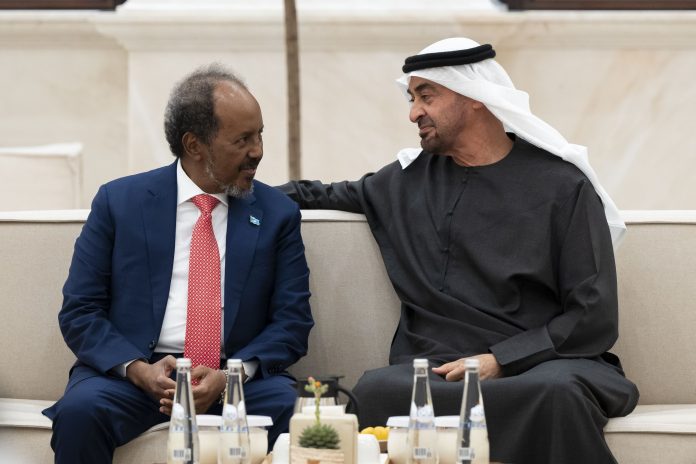Abu Dhabi (Caasimada Online) – Somali President Hassan Sheikh Mohamud arrived in Abu Dhabi on Sunday to press UAE President Sheikh Mohamed bin Zayed Al Nahyan for urgent financial and military support. Somalia is fighting a resurgent Al-Shabaab insurgency and a worsening economic crisis.
The unannounced visit, hosted at Qasr Al Bateen, highlights Mogadishu’s desperate bid to secure aid amid delays in the UAE’s response to Somalia’s recent plea for assistance.
The meeting included top Emirati officials, such as Sheikh Mansour bin Zayed Al Nahyan, Deputy Prime Minister and Chairman of the Presidential Court, and Sheikh Hamdan bin Mohammed bin Rashid Al Maktoum, Dubai’s Crown Prince and UAE Defense Minister.
According to the UAE’s state news agency WAM, the leaders exchanged Ramadan greetings and discussed deepening “fraternal ties” to advance Somalia’s stability and development.
“The talks focused on strengthening bilateral cooperation, particularly efforts to enhance Somalia’s growth and security,” WAM stated.
Somalia’s mounting challenges
Sources told Caasimada Online that Somalia recently sought significant aid from the UAE, including emergency funds to address a budget deficit and military support—such as airstrikes—to counter Al-Shabaab’s territorial gains.
The Al-Qaeda-affiliated group has escalated its campaign in 2025, exploiting the Somali Federal Government’s (SFG) financial woes. The U.S. decision to cut funding for Somalia’s elite Danab Brigade, a key counterterrorism unit, has deepened the shortfall, weakening security forces.
According to WAM, Mohamud praised the UAE’s “crucial role” in Somalia’s pursuit of stability and prosperity.
“We are grateful for the UAE’s consistent support, which has been vital to our people’s aspirations,” he said, according to a statement relayed by Somalia’s presidential office.
Yet, the visit’s urgency suggests a broader mission: to unlock immediate resources to prevent a collapse of Somalia’s fragile state infrastructure.
During Mohamud’s first term (2012-2017), Emirati aid surged, supporting infrastructure and security projects.
However, strains have emerged. In April 2018, Somali forces confiscated $9.6 million from a UAE plane at Mogadishu airport, suspecting it was intended to destabilize the government—a claim Abu Dhabi denied.
Relations strengthened again after Mohamud’s 2022 re-election, with the UAE providing drones and training to combat Al-Shabaab in 2023. In response, the UAE suspended a military training program, only resuming support after Mohamud’s return to power.
A turning point came in February 2024, when Al-Shabaab attacked the General Gordon camp in Mogadishu, killing four Emirati soldiers and a Bahraini officer.
The assailant, a Somali soldier trained by the UAE, raised alarms in Abu Dhabi about the management of its investments. “The incident exposed vulnerabilities in how our aid is utilized,” an Emirati official told Reuters anonymously last year, signaling a shift in UAE policy.
Regional tensions and strategic interests
The UAE’s expanding ties with Somalia’s semi-autonomous regions, notably Somaliland, have fueled friction. In February 2025, Somaliland President Abdirahman Irro attended Dubai’s World Governments Summit, lobbying for international recognition.
Somalia’s Foreign Minister Ahmed Moalim Fiqi condemned the move as “a direct affront to our sovereignty,” per a statement on SNTV. Yet, Deputy Foreign Minister Ali Balcad struck a conciliatory tone on March 9, telling SNTV, “Our partnership with the UAE remains strong despite these challenges.”
Somalia’s location along the Gulf of Aden, near the Bab el-Mandeb Strait—a chokepoint for 10% of global oil trade—makes it a strategic asset for the UAE.
Abu Dhabi has invested heavily in the region, including a $442 million deal with DP World in 2016 to develop Somaliland’s Berbera port.
This aligns with the UAE’s broader goal of securing the Horn of Africa against piracy and Iranian influence, though it stokes Mogadishu’s fears of Emirati support for secessionist agendas.
Mohamud’s visit seeks to reverse a decline in UAE support since the Gordon camp attack. According to Caasimada Online sources, Abu Dhabi has hesitated to respond to Somalia’s latest request, citing concerns about transparency over past funding.
The UAE has increasingly pivoted to regional players like Puntland and Somaliland, exemplified by Irro’s warm reception in Dubai. This shift and Balcad’s softened rhetoric underscores Mogadishu’s dire straits.


